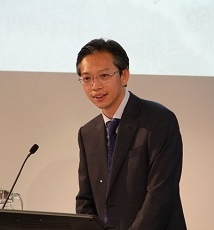
his first major speech since he took office.
Image from http://www.victoria.ac.nz/chinaresearchcentre/
Chinese Ambassador Wang Lutong recently (11 Apr, 2014) gave a speech to a full house at the University of Wellington.
This was His Excellency Ambassador Wang’s first public address since taking office in Wellington and he thanked the New Zealand Contemporary China Research Centre and NZ Institute of International Affairs for inviting him to discuss China’s development and also China-NZ relations. He apologised for not speaking publicly before but repeated an old Chinese saying – “No investigation, no say”, meaning that until he had learned something of NZ and had a comprehensive understanding of homeland and host country, he had not commented until he felt that such preparation had become the foundation for carrying out his duties.
This foundation has been well and truly achieved: Ambassador Wang, since his arrival five months ago, has met many cabinet ministers, parliamentarians and business leaders as well as having been interviewed by the NZ Herald. He explained then that he intended to visit as much of New Zealand as possible and has since been to Auckland, Canterbury and Dunedin and interacted with many people from all walks of life. He considers that this has made him realise that the present bilateral relations have brought tangible benefits to both countries with closer people-to-people ties.
Ambassador Mr Wang had accompanied Prime Minister Key on his fourth visit to China – a visit that attracted great attention. He considers that the visit was made at an opportune moment, when two sessions (of the CPC and the CPPCC) had just concluded, making John Key the first prime minister to learn of the Government’s future plans for the following five years. Our Prime Minister was also the first invited world leader to meet the new Chinese leadership and Ambassador Wang emphasised that this quickly established a very good working relationship between them.
He said that China has grown to become NZ’s largest trading partner in 2013 and new goals are being set now, ensuring that economic and trade relations, food safety and specific economic and trade problems might be resolved. Prime Minister Key later joined President Xi Jinping with other world leaders for the Third Nuclear Security Summit. China will host Conference on Interaction and Confidence Building Measures in Asia (CICA) and Asia-Pacific Economic Cooperation (APEC) meetings and the G20 Summit will be held in November, 2014, in Australia giving New Zealand a rare chance to attend for the first time. Mr Key also attended a private dinner with President Xi Jinping – the first for over 20 years. Mr Wang agreed with NZ Herald journalist Fran O’Sullivan who commented: “A presidential invitation is a sign that China sees NZ not just as a trading partner but as a member of the family”.
The new agenda also set the NZ dollar as the sixth currency to trade directly with the RMB – a significant step after the NZ-China Free Trade Agreement, opening a new chapter in investment and financial co-operation.
Ambassador Wang then declared that China’s development has directly benefited from consistent reform and an opening-up policy for over 30 years and a new path of modernisation and peaceful development has been tirelessly pursued. This had benefited not only the people of China but also the peoples of the world. China’s new season of reform is one of better quality and higher efficiency. However, President Xi Jinping has said, ”The tasty meat has been eaten up and what’s left are the tough bones that are hard to chew”.
Last November, the third plenary session of the 18th CPC Central Committee decided to deepen the reform and attract the widespread interest of international society. This has led to New Zealanders paying more attention to the CPC conference than usual. The main intention is to address the pressing problems hindering economic and social development, which are of concern to the majority of Chinese people. This must be fair and just and one of the first requirements is to award urban status to 100m people. This involves more than 20 groups of cities, more than 180 cities at prefecture level and 10,000 towns. The three tasks in this project are:
- to grant urban residency [hukou] to 100m rural people who have moved to the cities,
- to rebuild rundown city areas and villages inside cities where about 100m people live and
- to guide the urbanisation of around 100m rural residents of the central and western regions in cities there.
This will strengthen development in these regions.
The next most important goal is to respect Nature again. Smog has become one of China’s biggest issues and the Government intends to fight it by cutting emissions of sulphur dioxide and chemical oxygen by 2%. This will be achieved by controlling pollution emissions, changing the way energy is produced and consumed, and pursuing ecological protection and development, with the return to the blue sky, protecting the land the Chinese people depend on.
The final goal will be to open up China to the outside world and ensure its performance is at a high standard, with more service sectors open to foreign capital and a level playing field in domestic and foreign enterprises to compete on fair terms so that China remains a top choice for foreign investment. Reform of the management of outbound investment will be recorded and much of the review and approval of these investments will be organised by lower-level governments .
Ambassador Wang ended his speech by saying that the most important goal for New Zealand and China would be a greater understanding of each other’s culture, core interests and concerns. This includes investment in each other’s country in the form of agriculture, animal husbandry, technology and environmental protection. He also hopes that New Zealand will continue to protect its food-safety policy, safeguarding the rights of Chinese consumers. And his final request was to urge Kiwis to consider not just China as a whole, but rather aim at trading with China’s provinces and cities, as their economic strength is burgeoning, opening up further every day as the provinces extend their economy.
He closed with a hope that the two sides will deepen their mutual understanding of each other and, in typical poetic Chinese style, quoted the expression: ‘A composer cannot write enchanting melodies with one note and a painter cannot paint a landscape with one colour’.
“I hope that all our friends may focus on the joint development of China-New Zealand relations, contributing ideas and playing their roles in working together for the mutual good of both countries. ”
Ambassador Wang then took the opportunity to announce two new scholarships from the Embassy for Victoria students to study in China before opening the floor to questions from the audience.
The public lecture was jointly hosted by the New Zealand Contemporary China Research Centre and the New Zealand Institute of International Affairs and was introduced by Victoria’s Deputy Vice Chancellor of Research, Neil Quigley, with concluding comments and thanks from Peter Harris, Acting Director of the China Research Centre.
For the full text of Ambassador Wang Lutong’s speech, click HERE
Teri France, April 2014




